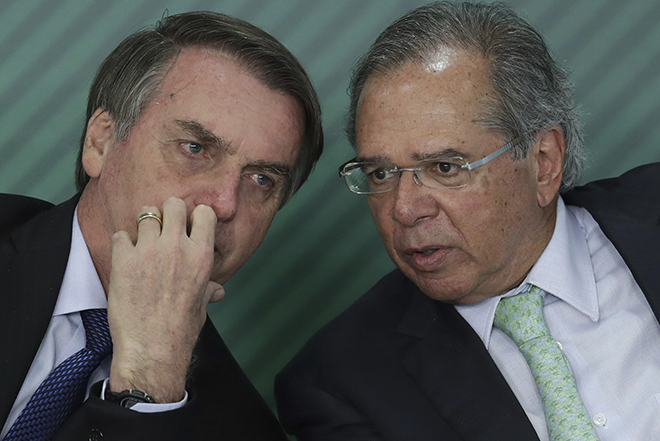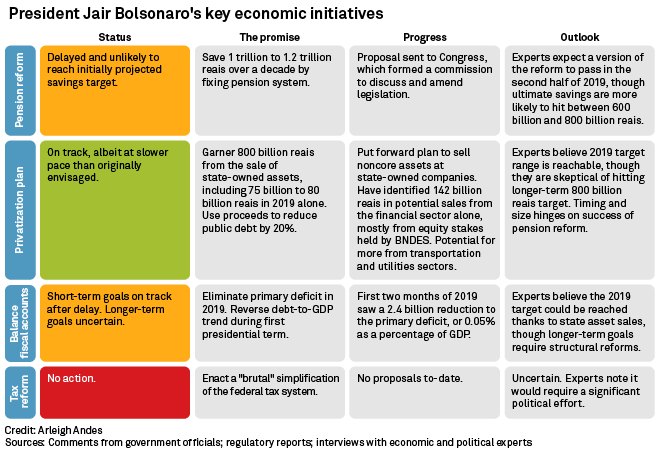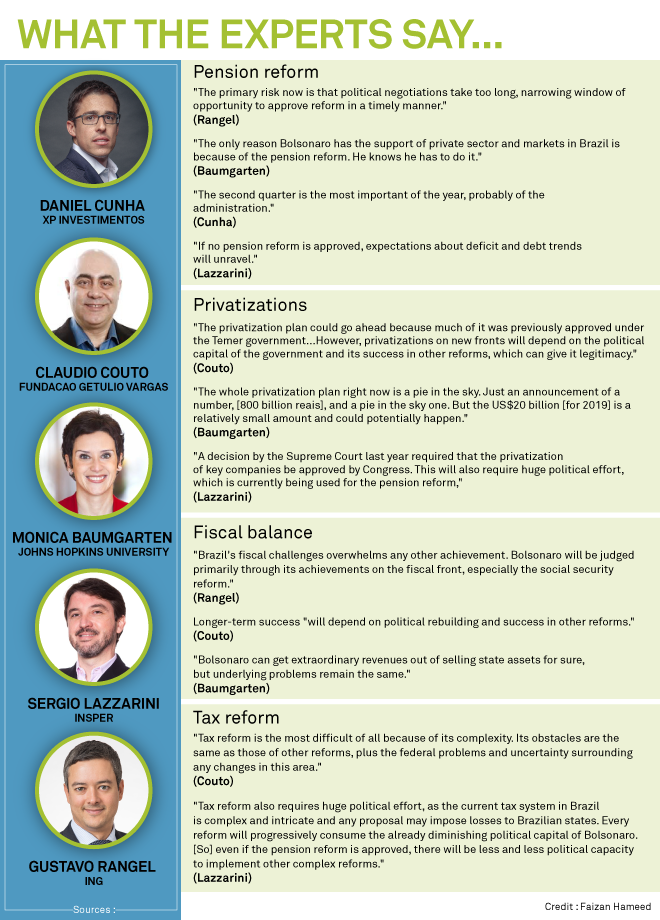 |
As Jair Bolsonaro marks 100 days in office as Brazil’s president, industry experts have given him high marks on his economic initiatives but also caution that political turmoil has risked delaying and diluting those efforts.
Since the president took office at the start of the year, investors remain cautious as to whether the president’s administration can enact proposals to jump start Brazil’s anemic economic recovery and resolve chronic fiscal problems once and for all. Of the 16 legislative proposals that Bolsonaro’s administration has put forward during his first 100 days — traditionally the so-called honeymoon period of a presidency — none have been ratified by Congress yet.
Some have blamed the lack of legislative momentum on Bolsonaro’s own missteps and antagonistic leadership style — a trait that helped coin his nickname,”Trump of the Tropics.” He also continues to be publicly unpopular. A recent poll from Datafolha gave Bolsonaro the worst approval rating of any Brazilian president at the three-month mark since the country returned to a democracy in 1985. About 30% of those surveyed believed that his government is “bad or terrible.” A separate poll from Ibope showed his approval rating has dropped 15 points since taking office.
“Bolsonaro managed to mess up his honeymoon period like no other before, including [former President] Dilma Rousseff, whose ability to deal with the legislative power was paltry,” Claudio Couto, a public policy professor at Fundação Getulio Vargas, said in an interview.

Experts pointed specifically to a series of criticisms against key congressional members — including Rodrigo Maia, the speaker of Brazil’s Lower House who had been leading the coalition-building effort to pass the reforms — as damaging an already fractured relationship between the executive and the legislative branches. That in turn, has threatened the timely passage of key economic reforms.
“Pissing these guys off is not a good idea when you are trying to pass pension reform,” said Monica Baumgarten, director of LatAm Studies and Emerging Markets at Johns Hopkins University. She characterized the president’s first 100 days as having “no real accomplishments and a lot of noise.”
That political noise “should be monitored,” analysts from Bank of America warned in a recent report, “as it increases risks of delays and dilutions on the reform discussions.” Moody’s issued a similar warning, saying in a report that the “adverse dynamic between the government and the legislature increases political uncertainty and weakens the government’s ability to gather sufficient votes to approve [pension] reform.”
But beyond the political turmoil, some experts point to positive early signs in Bolsonaro’s administration, namely to his appointments of widely respected senior officials to push the economic agenda through.
“The first 100 days are pretty much based on signs, and all the signs financialwise were very good,” Daniel Cunha, chief economist at XP Investimentos, said. “No. 1, you put together a really solid economic team. No. 2, the team really understands what the priorities are to fix the economy.”
Gustavo Rangel, chief economist of LatAm with ING, echoed those sentiments, referring to senior appointments at the Economy Ministry, Banco Central do Brasil and important state-controlled companies like Banco Nacional de Desenvolvimento Econômico e Social as “exemplary.”
Much of the work in developing and implementing key economic reforms has fallen to Economy Minister Paulo Guedes, who has prioritized the passage of pension reform above most other agenda items. Despite issues in congress, most who spoke to S&P Global Market Intelligence still believe that some version of pension reform will eventually pass, though it likely will be less robust than initially envisaged.
“It is clear that the approval process will be dominated by ups and downs, a lot of volatility and a significant water-down of the original proposal,” Elijah Oliveros-Rosen, a senior economist with S&P Global Ratings, said during a conference call.
Currently, most experts expect legislative voting on pension reform to start in June, and for passage to come during the second half of the year. But while Bolsonaro’s administration targeted some 1 trillion to 1.2 trillion reais in savings over 10 years from the reform, compromise to pass it means it likely will save less. XP Investimentos estimates savings will ultimately amount to about 800 billion reais, while Moody’s expects full fiscal benefits to hit between 600 billion and 800 billion reais.
While Bolsonaro’s signature pension reform is front and center, his administration has also put forward a number of other, interconnected agenda items that seek to address Brazil’s fiscal challenges. These include raising billions of reais through privatization sales, lowering its primary deficit and reforming the tax code.
Some of these items are seeing some traction, but experts note that these are unlikely to get much attention until after the government takes care of pension reform.
“Only after pension reform you can open doors and start to discuss other initiatives like tax reform or privatization,” Cunha of XP Investimentos noted.

As of April 9, US$1 was equivalent to 3.86 Brazilian reais.






